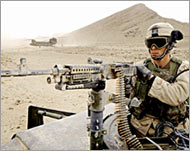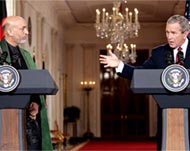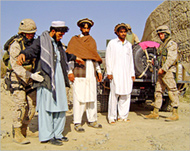Strains in US-Afghan ties on display
Strains in US-Afghan ties are on full display despite the signing of a strategic partnership accord by US President George Bush and his Afghan counterpart Hamid Karzai in Washington.

The pact will enable long-term US involvement in Afghanistan’s security as well as reconstruction.
Among the key points of the agreement signed on Monday was allowing US military forces operating in Afghanistan to have continued access to the key Bagram Air Base, as well as other military facilities as “may be mutually determined”.
American access to these facilities was necessary for US forces to “help organise, train, equip, and sustain Afghan security forces”, according to the joint declaration of the US-Afghanistan Strategic Partnership.
“It’s a partnership we have been working on for quite a while,” Bush said with Karzai by his side after their meeting at the White House on Monday.
“It’s a partnership that establishes regular, high-level exchange on political, security and economic issues of mutual interest,” Bush said.
No concessions
Karzai, however, left the White House with no promise of more control over thousands of US troops in his country, and with strains in his relationship with the US on full display.
 |
|
Bush rebuffed Karzai’s bid to win |
Despite Monday’s side-by-side news conference that was designed to showcase US support for Afghanistan’s first democratically elected leader, Karzai also got no promise of the quick repatriation of Afghan prisoners now in US custody at Guantanamo Bay, Cuba, and elsewhere.
Both issues have caused Karzai headaches at home, where anti-American sentiment recently exploded over a news report, since retracted, that US interrogators flushed the Quran down a toilet.
Sixteen Afghans died in anti-American demonstrations this month.
“Of course our troops will respond to US commanders,” Bush said, even while praising the progress of Afghan forces and taking pains to say that the US military consults with Karzai’s government.
Best friends
Since helping to bring down the Taliban in 2001, Washington has remained Karzai’s biggest supporter, both in terms of reconstruction aid and its military presence – with 18,000 troops on the ground fighting remnants of the Taliban and their allies.
 |
|
Karzai met Bush at the White |
Karzai has been a key advocate for a permanent security relationship with the US, but had stopped short of calling for full-time US bases, a sensitive topic in the war-shattered country.
In an apparent bid to ease any concerns, Bush said that under the new pact, the US would “consult with Afghanistan if it perceives its territorial integrity, independence or security is at risk”.
“Of course our troops will respond to US commanders, but our US commanders and our diplomatic mission there is in a consultative relationship with the government,” he added.
Most of the US troops in Afghanistan are either based at Bagram airbase north of Kabul or at Kandahar airbase, which the US uses to launch raids against rebels still active in the south and east of the country.
The US also has an operating base at the old Soviet airport of Shindand in the western province of Herat near the Iranian border, and a forward operating base at Salerno in the southeast of the country, not far from Pakistan.
Afghan interests
Karzai, on his first White House visit after winning his country’s landmark presidential elections last October, said the “memorandum of understanding” he signed with Bush was for “long-term partnership” to enable Afghanistan “to stand on its own feet”.
He said continued US help was vital because parliamentary elections in September would mark the end of the so-called Bonn Process, a UN-backed plan to help rebuild the poor country after the overthrow of the Taliban.
 |
|
The issue of prisoner abuse by |
The two leaders also discussed the recently highlighted abuse of Afghan prisoners in US custody, with Karzai saying he was saddened over the cases, but added that they were “individual acts”.
“These things happen everywhere, as we are sad, we recognise that the American people, kind as they are to Afghanistan, have nothing to do with that,” he added.
Prisoner abuse
Eight Afghan prisoners have so far died in US custody in Afghanistan.
According to the New York Times, 27 soldiers faced probable criminal charges over two Afghan prisoner deaths.
The United Nations has condemned the new allegations of abuse and called for tough action to deal with offenders.
Karzai also said that Afghanistan, the world’s largest opium producer, hoped to cut poppy production by up to 30% this year by promoting alternative crops.
“Now if this trend continues, we’ll have no poppies, hopefully, in Afghanistan in another five or six years,” he said.
“That’s a promise we have given to the world and to the Afghan people, and that’s a promise that we will deliver on. Hold us accountable on that,” he said.